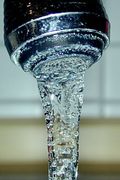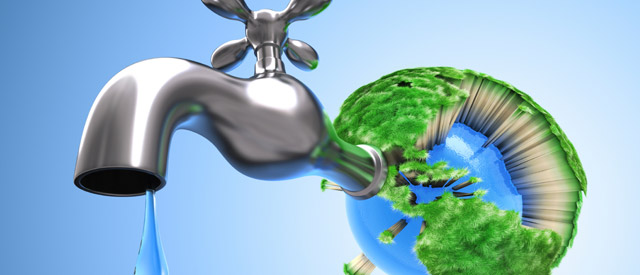 Note on the project of a Euro-Mediterranean know-how system in the water field, Marseilles 1996
Note on the project of a Euro-Mediterranean know-how system in the water field, Marseilles 1996
| Released | 03/03/2006 |
|---|
Note relative
to the Euro-Mediterranean Information System of Know-how in the Water
Field
Rome and Algiers conferences emphasized the social, cultural and economic importance of water, a scarce resource in the Mediterranean basin. Its management requires the best possible knowledge of existing tools, actors and methods. The available information on these items only exists in a fragmented, dispersed and heterogeneous way.
Therefore it is necessary to make an effort to rationalize and make this information readable, easily accessible and usable. This need should be met with the use of modern communication means. Such is the purpose of creating the proposed information system.
In order to set up a regional cooperation, the Mediterranean Water Charter (Rome, 1992) had decided on the creation of a Mediterranean Water Network whose implementation was subsequently studied during Valencia (1993) and Marseilles (1994) meetings. This Network aims at directing regional actions in the water field.
The Mediterranean Water Network should participate in the information system whose creation is proposed.
This information system does not replace it, but on the contrary, use the existing structures (operators and networks). It will thus have several locations.
Its purpose is to gather the existing information systems into a network.
Functions of the system
The following main functions would be assigned to such a system:
-
collecting information on each topic. This includes a search for and an inventory of information sources (organizations, people), regular retrieval of information from these sources and from new sources that could appear and the collection and organization of information,
-
selecting relevant parameters and standardizing them,
-
checking out information accuracy. This implies the setting up of a checking and up-dating system,
-
disseminating information. This involves the presentation of information and the possibilities of access for different categories of people and dissemination methods,
-
facilitating links. This implies exchanges of raw information, of information on techniques related to information and the setting up of contacts between organizations or people concerned by this topic.
Access to information that is available through this information exchange system should be open to all people interested in water management.
Proposed topics
The following topics were proposed as exchange topics to widen a Euro-Mediterranean dialogue:
TRAINING
Such a system should comprise organized information on:
-
contents of existing training,
-
location of training,
-
training organizations,
-
trainers,
-
training methods,
-
training materials,
-
quality certification,
-
validation of training (diplomas, taken into consideration by an employer,...),
-
sources of finance for training.
RESEARCH-DEVELOPMENT
Such a system should comprise organized information on:
-
research-development fields,
-
research-development organizations for each field,
-
people involved in research-development in each field,
-
research-development methods used in each field,
-
known techniques for each field,
-
existing documents in each field,
-
existing partners in each field,
-
sources of funds for research-development.
INSTITUTIONAL
Such a system should comprise organized information on:
-
theoretical types of institution and organization,
-
existing institutions and organizations for each field and type,
-
people involved in the work on institutions and organizations (practical and theoretical work),
-
methods for setting up each type of institution and organization,
-
management and operating methods for each type of institution and organization,
-
sources of funds for setting up institutions and organizations.
DATA ADMINISTRATION
We will deal here with statistical infor mation methods and then preparation of data related to water, requirements, resources and catastrophe forecasting.
Such a system should comprise organized information on:
-
collection and checking methods,
-
data management methods (standards, sampling, periodicity,...),
-
sources of data collection, existing organizations and data banks,
-
methods for forecasting demands, needs, and natural catastrophes,
-
methods for assessing the quality of water and media,
-
modes for presenting data,
-
sources of funds for data collection.
DOCUMENTATION
The aim is to facilitate the publishing and dissemination of institutional, scientific and technical documents, including those concerning the four above topics.
Such a system should comprise organized information on:
-
identification of specialized documentation centres,
-
existing documentation and its evaluation,
-
methods used for processing/dissemination,
-
access means and technologies,
-
standardization (thesauri, exchange system, publishing),
Other topics could be added into such a system.
Implementation proposal
Many operators already intervene on these topics, either at national level, or within community, Mediterranean or multilateral networks.
We remind you that this system will be established with these operators.
It would be progressively set up according to the capacity of local operators to enter this system. In a first phase, it implies the commitment of a first group of operators in charge of preparing reference tools for transferring information on the five chosen topics.
The action plan and the means necessary for implementing this system require various investigations to be made. These should be entrusted to experts to deal with:
-
the identification, using topics of action, of operators that can be rapidly mobilized,
-
the examination and evaluation of information transfer systems that are already organized within existing networks in order to broaden them,
-
the examination of the possibilities for widening and gathering these networks to open them to all interested Euro-Mediterranean partners,
-
draw up proposals for the organization of this network.
Thanks to this mission that should regroup experts from the Union member countries and Mediterranean partners as well as from the Commission, conclusions would be presented during a seminar as soon as possible. Personalities would be invited to this seminar:
-
managers of water administrations,
-
operators that may be involved in the project.
 you are not logged in
you are not logged in





